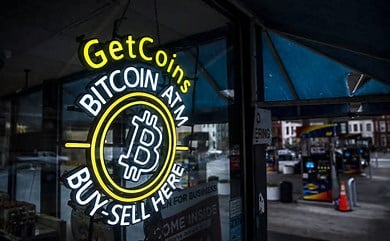Bitcoin ATM scams are soaring Updates
Bitcoin ATM scams are soaring — and older adults are increasingly the victims
Bitcoin ATM scams are soaring : Cash, bitcoin and gold scams send couriers, directions to ATMsThe FTC said reported losses exceeded $110 million last year, up nearly tenfold since 2020, as fraudsters increasingly persuade victims to send them large sums through crypto kiosks. Call it a diabolical new twist on an old scam: ATM fraudsters are turning to bitcoin.
Data the Federal Trade Commission provided to NBC News show the amount of money consumers have reported losing to scams involving Bitcoin ATMS rose nearly tenfold since 2020, topping $110 million in 2023.
Lucid stock price prediction 2025, 2030, 2035, 2040, 2050
And older people are getting roped in the most. The agency said consumers over age 60 were more than three times as likely as younger adults to say they were duped out of cash in these schemes.
Tune in to “NBC Nightly News with Lester Holt” at 6:30 p.m. ET/5:30 p.m. CT tonight for more.
“Scammers are using these machines as a way to take money from people more than we’ve seen in the past,” Emma Fletcher, a senior data researcher at the FTC, told NBC News.
Bitcoin ATMs look like traditional ATMs and operate similarly, in that they can be used for both deposits and withdrawals, but the transactions involve cryptocurrencies.
The machines are banned in some countries, including the U.K. and Singapore, but they’re legal in the U.S. According to one estimate, there are nearly 32,000 nationwide today, up from just over 4,000 at the start of 2020. The kiosks can now be found in high-traffic locations like convenience stores, gas stations and supermarkets — something that has helped fuel the fraud uptick, federal authorities say.
In many of the incidents the FTC identified, fraudsters contact a victim — or the victim inadvertently connects with them — claiming to be a customer service representative flagging an attempted identify theft or an account breach.
Eyeing on $1.55 billion the Powerball jackpot? Here’s what you’d pocket after taxes.
They eventually text their targets a square-shaped QR code — like the ones diners frequently use to pull up restaurant menus — connected to a digital wallet. The victim is typically directed to scan the code and deposit cash into the Bitcoin ATM, which converts it into bitcoin that immediately gets transferred to the scammer — all while the victim thinks they’re protecting their assets.
Scammers have a number of ways to concoct a successful ruse. There are sometimes multiple fraudsters in on a given heist pretending to be employees of a government agency or business, including major tech firms like Microsoft or Apple, according to the FTC.
A scam often begins when bad actors get their hands on a victim’s phone number — many of which are increasingly available on the “dark web,” the part of the internet that typical browsers and search engines can’t reach, like certain chatrooms, and that has helped enable illegal activity.
Fraudsters will often contact victims claiming to flag an urgent problem with an account, sometimes through a message that looks like a legitimate alert, like a pop-up notification.
Oklahoma City resident loses thousands in cryptocurrency ATM scam
OKLAHOMA CITY (KOKH) — The Oklahoma City Police Department (OKCPD) is warning citizens about a recent cryptocurrency ATM that resulted in a victim losing tens of thousands of dollars.
Investigators said the victim received a notification after logging in online saying the account was being compromised.
With the notification, came a number to be called. The victim reportedly called it and spoke to someone who convinced her to give access to her online accounts.
Money was withdrawn and deposited into a cryptocurrency ATM.
OKCPD released the following tips to protect others from the scam:
- Never trust unsolicited notifications about account compromises—especially those that ask you to call a number or provide sensitive information.
- Be cautious with cryptocurrency transactions. Legitimate companies will never demand you withdraw and deposit cash into a cryptocurrency ATM.
- Verify independently. Contact the company directly using a verified number or website, not the one provided in the suspicious notification.
Scammers know the nearest bitcoin ATM
Once they have the cash, the person often is then told where to drive to find a bitcoin ATM in their area, perhaps at a supermarket, gas station or liquor store.
In Michigan on Aug. 15, a Troy woman in who was being hounded by scammers in a multipronged scheme was instructed to go to a bitcoin kiosk at a local gas station, according to a report made to the Troy Police Department.
The scam began with an email that later evolved to being told to click a link for canceling a $449.99 annual subscription. But somehow along the line, she was told that $3,966 was refunded to her account by accident and she’d need to return it. Crooks often are able to make claims of accidental refunds look real when they’re not.
During a phone call asking for the money back, the woman was told to withdraw cash from the bank and head to the bitcoin ATM. Even that wasn’t enough for the crooks, they later claimed that they did not receive all the money and she still owed $1,000. She could pay that, they said, by gift cards. She read the serial numbers off two $500 gift cards over the phone in a call with the suspects.
